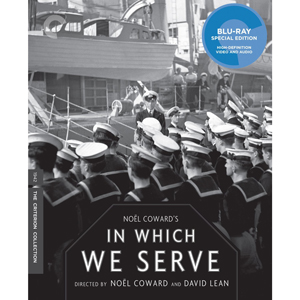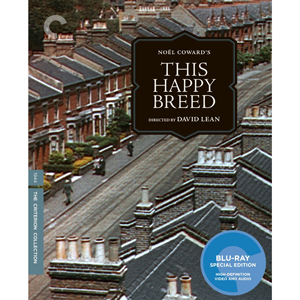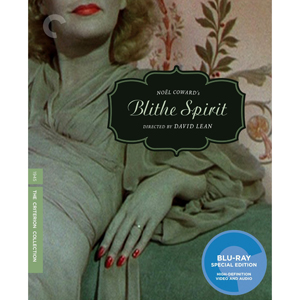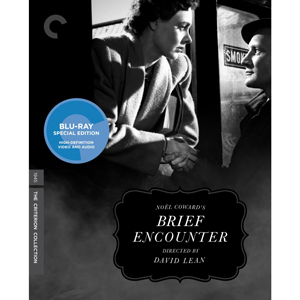
 |
|
|
|
The English rightfully think dearly of David Lean, as the BFI National Archive spent a fortune restoring the director's first ten films several years ago. The first four titles have just appeared on Criterion's Blu-ray set David Lean directs Noël Coward. The famous performer, playwright and composer co-directed the first film and provided the stories for all four. As recounted in the excellent extras in the four-disc set, Coward enabled the development of an exceedingly talented partnership that would be known as The Cineguild: director-writer David Lean, cinematographer-writer Ronald Neame and writer-co-producer-production manager Anthony Havelock-Allan. Coward would chastise his "little darlings" when he didn't like their work, but he supported them fully. These four wartime films launched the careers of several major actors and are still considered the top British films of their day. 
In Which We Serve began as Noël Coward's show, as he starred, produced and wrote the original script, basing his story on Lord Mountbatten's exploits in the Royal Navy. According to historian Barry Day, "The Darlings" brought Coward's overlong script to length by reformatting various subplots as flashbacks. Survivors of a sunken destroyer cling helplessly to a life raft while German planes strafe them; several remember events back home that illustrate the excitement and tragedy of the wartime experience. As a wartime morale-raiser Coward's film cannot be bettered. The civilians back home (lovely Celia Johnson and Kay Walsh) fret and suffer German bombing raids. Captain Kinross (Coward), Seaman Shorty Blake (John Mills) and C.P.O. Hardy (Bernard Miles) bob on the ocean covered in fuel oil, as ripple dissolves flash back to their memories of life on shore. The drama is honest and powerful. It's obvious that wartime English audiences were transfixed -- unlike our experience, the Nazi threat was on their doorstep. Coward does lay on his pro-Navy recruitment messages rather thickly. Although the sailors complain, comments about the excellent food proliferate, even the playwright's favorite drink of "hot cocoa". The feeling of authenticity is more than a matter of excellent sets (an entire section of the ship was replicated on a soundstage). Many of the sailors and soldiers seen in the show are real troops, volunteering during leave. Among the excellent cast are Michael Wilding as a smiling officer, a young James Donald as the ship's doctor and future director Michael Anderson as a Marine. In Which We Serve was a big break for the very young Richard Attenborough, who debuts as a cowardly sailor. Attenborough already has his tortured misfit act down pat. 
This Happy Breed is an ambitious adaptation of a Noël Coward play, a between-the-wars extension of his earlier success Cavalcade. The episodic story records the fortunes of the lower middle-class Gibbons family. They move into a row house at the close of WW1, and at the finale, takes their leave just as WW2 is beginning. We watch as their children grow up during times of labor unrest and political radicalism; each episode ends in a heavy fade to black. Frank Gibbons (Robert Newton, looking positively sober) is happy to find Bob Mitchell, an old army buddy (Stanley Holloway) living next door. They go on periodic benders, much to the dismay of Frank's reserved wife Ethel (Celia Johnson). A sister and an Aunt live on the premises and fight like cats and dogs, but the kids Queenie, Vi and Reg (Kay Walsh, Eileen Erskine & John Blythe) get along well. Vi marries and promptly tames an outspoken political radical. Reg eventually marries, which brings about a humorous scene where Frank dodges his duty to tell him about sex. Queenie is bitterly dissatisfied with her "common" surroundings and becomes determined to break free. She loves Bob's son Billy (John Mills) but rejects him because he's a sailor, and she wants something better. When she does run away, Frank and Ethel are heartbroken. David Lean had co-directed In Which We Serve in conjunction with Noël Coward, but here he and his Cineguild cohorts fashion their own kind of show. With the luxury of Technicolor they make the tired old house into a character all its own. We notice the patterns left on the wallpaper when furniture is moved. The camera peeks through doorways and slips out the garden doors to the family's bit of green yard. The film has some particulars in common with Minnelli's Meet Me In St. Louis -- it manages a representation of a major fair and builds an entire scene around the social havoc that occurs when the family hires cars to take them to their son's wedding. Robert Newton and Celia Johnson make a fine couple. Although accounts in the extras reveal that the actor fell off the wagon at least once during production, this is a different Newton from the boozy, entertaining ham we know from his "Long John Silver" years. The actor matches Celia Johnson for sensitivity, and many scenes are honestly affecting. Kay Walsh comes into her own here. Noël Coward is said to have been very class conscious, but Queenie Gibbons' big flaw is her desire to escape her surroundings. As bad as her decisions are, the message is more 'stay in your place' than 'seize the day'. The war film was a storyboard-and-montage effort, but This Happy Breed shows Lean (and his Cineguild partners) mastering a show that builds on flow and long takes. Like memories, it seems to be constructed of little fluid moments in time, the isolated instances that stay rooted in the memory as other events fade around them. 
Long a favorite of American Anglophiles, Blithe Spirit retains more of the feeling of its source, a popular Noël Coward comedy. The other three films stress Coward's affinity for human subjects, whereas Spirit harks back to his brittle, sophisticated stage work. His leading characters are smart moderns that dish out clever reparteé and do their best to maintain a reserve no matter what outrageous things occur. A story that begins as a rather contemptible party game develops into a full-scale film blanc fantasy. Smug, urbane author Charles Condomine (Rex Harrison) bickers with his second wife Ruth (Constance Cummings) before a dinner party. As a lazy way of collecting research for his next book Charles has invited the local eccentric Madame Arcati (Margaret Rutherford), who claims to converse with the spirit world. Arcati's hilariously eventful séance seems a failure until the guests have gone home. Rex quietly asked to speak to his deceased first wife Elvira (Kay Hammond) -- and his request has been answered. Visible and audible only to Charles, the greenish phantom Elvira gets her ex- husband into deep trouble with Ruth, who is convinced that he's simply misbehaving to annoy her. Another fine achievement in Technicolor lensing -- camera-wise viewers will wonder how the greenish Elvira was lit without her green key light spilling onto other parts of the set -- Blithe Spirit will entertain depending on how much one enjoys veddy proper British comedies of manners. The famous Coward wit is often at its peak, but his jokes also take pot shots at easy targets, such as a quick throwaway put-down of the movies en toto. The part of Blithe Spirit everybody enjoys is the energetic, wonderfully daffy Margaret Rutherford. She could always be counted on to enliven a movie but Spirit puts her front and center for an entire reel at least. In contrast to the rather unlikeable, self-absorbed leading players, Madame Arcati is an adorable hoot. 
The serious Brief Encounter belongs with a small group of postwar movies where the romantic element is bittersweet, if not outright despairing. Unlike It Always Rains on Sunday, this is less of a genre or noir piece than a slice-of life tale about an unfulfilled housewife who falls in love with a doctor she meets in a railway station. It's the payoff role for Celia Johnson and also made a star of Trevor Howard. Suburban Laura Jesson (Celia Johnson) and Dr. Alec Harvey (Trevor Howard) meet at a railway Tea Room and spend a string of Thursday afternoons together. He's married as well; guilt gnaws at Laura even as she admits that she looks forward to their meetings. They both realize that to run off together would hurt a lot of people and most likely ruin their lives as well. But neither has the will to call it off. This time the Cineguild partners expanded greatly on Noël Coward's original play. A man of more than a few affairs, David Lean takes pains to portray incipient adultery as misery for the unhappy people that consider it. Soap operas about wandering spouses typically take place in glamorous settings and the people involved get a chance to enjoy "the thrill of romance" before the inevitable problems settle in. Laura imagines such things only as a pipe dream. She and Alec feel guilty and ashamed every step of the way, and Laura in particular sees no possibility of pursuing the relationship. Both are rapidly approaching middle age and are desperate for each other. Yet there's just too much social pressure and inner resistance preventing them from breaking free. Frequently listed among the most romantic films ever made, Brief Encounter is really about romance frustrated. The intimate love story closely follows the emotions of the Celia Johnson character. David Lean saves his expressionistic touches for subjective moments. The room darkens around the downcast Laura, and the camera tilts as she briefly loses control of her emotions. Lean emphasizes the intensity of her feelings when a view of Laura in an armchair suddenly invades a shot of the lovers in a train station tunnel. But most of the show takes place in mundane surroundings. Both Laura and Alec interact with people that give them no doubt that, should their secret become known, they will become social outcasts. Brief Encounter fell out of favor for a number of years; I've read critiques that call the characters weaklings unworthy of romance and incapable of making decisions for themselves. That attitude forgets that there will always be people that hesitate for good reasons. Plenty of souls need to square themselves with the social order and try their best to honor their promises and vows. Once again, the Cineguild partners made a Noël Coward story cinematic with a fractured time structure, this time imposing a pattern similar to the murder noir Double Indemnity. The feature-length flashbacks in both films are covered by the voiceover thoughts of the leading character. Instead of a hardboiled narrative, Laura's inner voice communicates her frantic emotions, disappointment and shame. Interestingly, the dialogue gives Laura the sensible dialogue. The unfaithful doctor must deliver a lot of "I love you" matinee drivel, which sounds as if it belongs in the matinees the pair attends on their chaste afternoons. Yet the film's emotional honesty is unimpaired. The time shift pivots around an innocuous, half-heard scene in a grim railway Tea Room, which ends up being repeated at the film's end. Only then do we discover how important, and tragic, the small scene is. Brief Encounter captures the dreadful weight of petty, seemingly insignificant moments, that can suddenly be weighted with awful importance and remembered for a lifetime. Criterion's deluxe DVD Blu-ray sets of David Lean directs Noël Coward rank high among their releases for 2012. None of these pictures has fared particularly well in previous video incarnations, but the BFI restoration plus Criterion's digital cleanup yields spectacular results. The two B&W shows never looked better and the Technicolor pair is stunning. Previous TV presentations of This Happy Breed were a grainy mess of dull color. Only now can we fully judge the clever lighting schemes that create Blithe Spirit's fantasy scenes with a minimum of optical effects. Anyone in doubt about the improvement should see the clips on some of the older documentaries and TV shows included with the set. The contrast is remarkable. Criterion's extras begin with video essays by the entertaining Noël Coward biographer Barry Day. His speeches are unbroken strings of interesting facts and relevant comments. I only caught one questionable statement, when he says that an underwater shot of Noël Coward from In Which We Serve was re-purposed from an earlier Coward picture. Brief Encounter carries a commentary by Bruce Eder. A variety of featurettes and found documentaries cover the four films from all sides, often abetted by interviews with surviving crew people. Docus new and old cover the four titles individually. A 1992 TV show concentrates on the life of Noël Coward, while a 1971 piece lets David Lean explain his own career. Richard Attenborough and Coward are also heard in a 1969 conversation at the National Film Theater. The charming cameraman-director-writer Ronald Neame appears in a pleasant interview and original trailers are included for each picture. Finally, an insert booklet contains fine essays by Ian Christie, Terrence Rafferty, Farran Smith Nehme, Geoffrey O'Brien and Kevin Brownlow.
On a scale of Excellent, Good, Fair, and Poor,
Reviews on the Savant main site have additional credits information and are often updated and annotated with reader input and graphics. Also, don't forget the 2011 Savant Wish List. T'was Ever Thus.
Review Staff | About DVD Talk | Newsletter Subscribe | Join DVD Talk Forum |
| ||||||||||||||||||